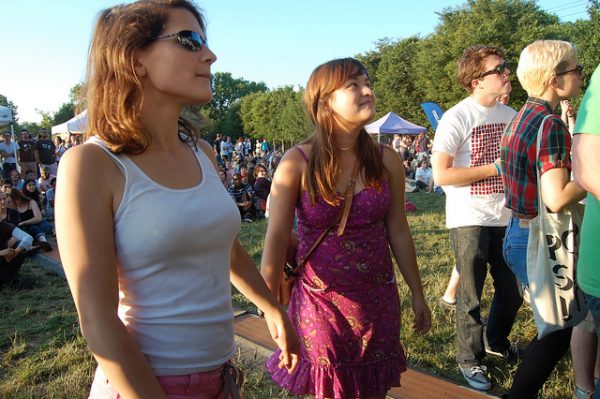
In a society that is increasingly encouraging sex positivity and sexual freedom, we may forget that individuals perceive men’s and women’s participation in certain sexual behaviors very differently. Sociologists have long recognized the sexual double standards that deem women ‘hos’ and ‘sluts’ as men reaffirm their masculinity for engaging in similar heterosexual behavior. Yet, Trenton D. Mize and Bianca Manago‘s new research suggests that men’s heterosexual identities may face greater risk of being questioned when participating in sex with other men than women’s heterosexuality when participating in sex with other women.
Mize and Manago conducted two survey experiments to test their hypotheses. First, they tested if straight men who engage in one same-sex encounter are more likely to have their heterosexuality questioned than straight women who engage in a same-sex encounter. Second, they tested whether men with a sexual history of primarily male partners are less likely to have their sexual orientation questioned than women with a sexual history primarily female partners. Participants from a nationally representative survey read an online vignette describing an individual’s sexual history, followed by a generic description of a single sexual encounter that contradicted the individual’s past sexual history. For example:
“Michael is currently single but has had multiple happy relationships with women in the past. Michael has only dated women and one of his relationships with a woman named Emily lasted for over two years. The other night, Michael met Matt and felt attracted to him. At the end of the night, Michael and Matt went home together and had a casual sexual encounter” (313).
Respondents then marked their categorizations of that individual’s sexual identity. In a follow up survey, the authors include more details of the sexual encounter such as “kissing” and “oral sex” to account for possible differences in perceptions of men and women’s sexual behaviors.
While 51 percent of participants identified women with a different-sex dating history (dating primarily men) who had a single same-sex encounter as heterosexual, only 31 percent of participants viewed men with similar backgrounds and behaviors as heterosexual. Instead, survey participants were more likely to label these men as bisexual or gay. Furthermore, men with a history of same-sex encounters that had one different-sex encounter were less likely to be considered heterosexual than women with similar sexual histories. These findings remain similar when including specific details (e.g. kissing, oral sex) of their sexual encounters. These insights allow us to understand how heterosexual men’s status of advantage make them more vulnerable to the loss of their heterosexuality. Because men’s heterosexuality is rigidly defined, engaging in same-sex sexual activity risks their straight identity and perhaps the privilege that accompanies it.

Comments 1
Michael Miller — June 28, 2018
Challenging men's heterosexuality because they have sex with a man may be the repetition of negative and suppressive attitudes of Western culture. Curiously, research at the University of Utah shows most women are physically attracted to other women. Other research shows that women are comfortable with other women's bodies and with physical closeness to other women. Not in our society, but in the SMALL primal emotionally bonded groups we are genetically programmed to be living in, it is women's nature to form their own subgroup within the primal group, where the bond with each other, talk with each other, groom each other, play together, help each other raise their kids, and to provide guidance for primal group. Though this is women's nature, it does not happen in our society, because with the coming of MALE HIERARCHY AND WEAPONRY about 11,000 years ago, our small primal groups have been wiped out and replaced by a mass society of disconnected strangers in which women have been suppressed and redefined according to the myths, attitudes, beliefs and needs of the males at the head of male hierarchy. .Women need to take back their nature from a male history of hierarchy and weaponry. . .